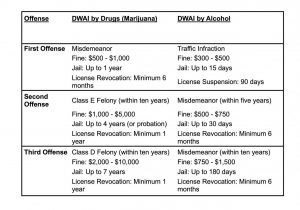Traffic Court Forum: Driving While Ability Impaired (DWAI) by Drugs vs DWAI by Alcohol
By A. Craig Purcell, Esq.

Historically, the news predominantly focused on driving while impaired by the consumption of alcohol. However, driving while a person’s ability to do so is impaired by drugs, including marijuana, is equally dangerous and critical. This is especially so in light of marijuana being legalized for recreational use in New York. This month we will delve into the distinctions between driving while ability impaired by alcohol and drugs, specifically marijuana, under New York State law.
We all know that it is illegal to drive a vehicle while your ability to do so is impaired by drugs, including marijuana, as stated in the Vehicle and Traffic Law (VTL) § 1192(4). Even for a first-time offense, the penalties for violating this law can be severe.
Below is a helpful comparison of the penalties for driving while impaired by alcohol versus drugs.
 It should be noted that a significant difference between these two offenses is the severity of the above consequences. A DWAI by marijuana conviction results in a criminal record from the first offense, whereas a first-time DWAI by alcohol does not. However, proving impairment due to marijuana can be more complex. Unlike alcohol, where Blood Alcohol Content (BAC) levels provide a straightforward measure of impairment, the presence of drugs like marijuana does not necessarily indicate impairment. The prosecution must demonstrate that the driver’s ability to operate the vehicle was actually impaired. However, there is a movement underfoot to lower the legal BAC limit, which would seriously affect the enforcement, prosecution, and defense of Driving While Intoxicated (DWI) cases. More will be written about this in future articles.
It should be noted that a significant difference between these two offenses is the severity of the above consequences. A DWAI by marijuana conviction results in a criminal record from the first offense, whereas a first-time DWAI by alcohol does not. However, proving impairment due to marijuana can be more complex. Unlike alcohol, where Blood Alcohol Content (BAC) levels provide a straightforward measure of impairment, the presence of drugs like marijuana does not necessarily indicate impairment. The prosecution must demonstrate that the driver’s ability to operate the vehicle was actually impaired. However, there is a movement underfoot to lower the legal BAC limit, which would seriously affect the enforcement, prosecution, and defense of Driving While Intoxicated (DWI) cases. More will be written about this in future articles.
Currently, there is not a universally accepted test equivalent to the breathalyzer for marijuana. This makes it more challenging for prosecutors to prove impairment beyond a reasonable doubt. Therefore, individuals charged with DWAI by drugs may have a stronger defense so long as they are prepared to challenge the prosecution’s evidence, including the legitimacy of the traffic stop.
However, let us remind you that while both substances can impair driving abilities, it is crucial to remember that smoking marijuana or drinking alcohol before driving isn’t illegal per se—impairment is the key factor. The law requires proof of impairment, not just consumption. As laws evolve, especially with the increasing legalization of marijuana, understanding these nuances becomes even more critical. If you’re facing charges related to impaired driving, it’s advisable to seek experienced legal counsel to navigate the complexities of the law.
A. Craig Purcell, Esq. is a partner at the law firm of Glynn Mercep Purcell and Morrison LLP in Setauket and is a former President of the Suffolk County Bar Association and Vice President of the New York State Bar Association







